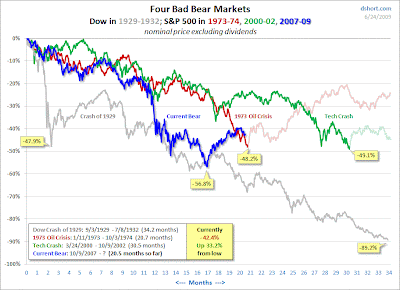Since Japan is so often, and as we think incorrectly, cited as a likely deflationary pattern for the US in monetary outcomes, and since so few who discuss this subject have an understanding of Japanese culture and social structures, I thought it would be timely to point out a basic fact that should be reasonably well known but is so often overlooked.
Japanese population growth is flat, and the percent of the population that is no longer economically productive is growing rather quickly.
So would we be so suprised that Japan's GDP is flat, and that their money supply growth is sluggish? One should not be, unless they are not bothering to look at the data.
America also has an aging population as do many countries, but Japan is unique because of its extraordinarily low rates of immmigration due to the very homogenous nature of Japanese society.
Japanese population is now estimated at about 127.7 million people with a very nominal immigration rate of about 20,000 people per year and a negative birth-death rate. 
When one mixes a negative native birth-death rate and very low immigration due to a rigid approach to race and citizenship, it should be no suprise that Japan has an unusually high level of elderly citizens.
The charts seem to suggest that countries with significantly aging populations with low population growth will experience a natural slow growth in GDP.
As you know we tend to like to view money supply growth and GDP in relation with each other and to per capita variables.
When one adds to this demographic mix the Japanese cultural bias to low domestic consumption and a high savings rate, and a bureacratic bias to a mercantilist industrial policy, the reasons for Japan's economic status become rather obvious.
I am not suggesting that Japan must change. I have spent many happy moments in Japan, and spent a great deal of time to learn the language and understand the culture, albeit with results inadequate to my hopes.
I have had many Japanese friends, and find great enjoyment in their art and music and social personality. I regret that I have not been to visit there in some years, and have forgotten so much and miss so many old acquantances. And I am particularly at a loss for their wonderful cuisine which I find fascinating, uniquely refreshing and delightful.
It is important to understand a country in its context, and with some attention to detail and its particulars, if one is going to perform an economic analyis and then perform broad comparisons and construct models.
Demographically speaking, Japan is an outlier with some unique characteristics. If one does not consider this, it can be a source of false conclusions.
26 June 2009
The Particularity of Japan from an Economic and Demographic Perspective
Tax Revenues Slump as the US Budget Deficit Soars
Income Tax revenue is taking a drop commensurate with the kind of slump which we are experiencing in domestic GDP.
But there is a bull market in government spending. This does not include much of the support being given to Wall Street banks and other 'off balance sheet' shenanigans.
Thanks to Escape From America Magazine for these charts.
25 June 2009
Jesse's Question for the Day
The expansion of credit in a fractional reserve banking system seems to be geometric.
The spending in the wage - price function, as captured by the velocity of money, seems to be more arithmetic, on the order of 2 or so.
Can money creation then fail to overcome the output gap if monetization is permitted and government spending has been and continues to be robustly in excess of tax receipts?
A refusal of banks to lend would tend to dampen the geometric power of credit expansion and a potential source of money creation. It also would tend to dampen velocity of money.
An undeveloped thought which this blogger is just beginning to consider, offered in the hope that someone might offer some useful data or existing theory on the subject.
And on a separate but somewhat related topic, the flip side of deflation is not hyperinflation as it is an extreme. People who based their risk portfolio only for the extremes of an outcome cannot consider themselves hedged since they are likely to be killed in the middle, the most probable, over a reasonable investment horizon.

































